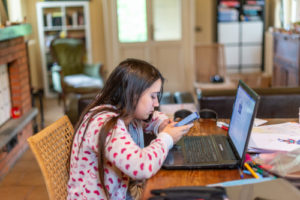Deciding to pursue higher education is a major commitment, especially for adult learners who often juggle multiple obligations including work and family. Distance education modalities provide flexible avenues to complete a degree while still fulfilling those other social roles. However, online learning is not without its inherent challenges, one of which is feeling connected and having a close academic support system throughout one’s program.
Chamberlain’s Social Determinants of Learning (SDoL) model emphasizes psychosocial health as key to student success (Sanderson et al., 2021; Study (chamberlain.edu)). The demands of a higher degree program require resiliency and dedication, both of which are bolstered by a sense of belonging and connection to one’s peers and institution (Gopalan & Brady, 2020).
The COVID-19 pandemic brought about many challenges, including increased feelings of isolation. Lockdowns that followed the spread of COVID-19 further strained our connection to others (Tice et al., 2021). With students feeling more detached in their usual daily lives, there has been an even greater need to understand and create that sense of togetherness in our university community.
Baumeister and Leary’s (1995) early work on the need to belong posited that humans have an innate, fundamental need to establish and maintain meaningful interpersonal relationships. Further, this need is crucial to a happy, successful life and absence of such relationships is detrimental to one’s wellbeing. We were, therefore, interested in understanding how this construct manifested for adult online learners amid a global pandemic, when our ability to relate to others physically and emotionally is vulnerable.
Towards that end, 2,233 Walden University online undergraduate and graduate students responded to a survey in Fall 2021, self-reporting the degree of their need to belong and the extent to which feeling like they belong to the Walden community was more effortful than they expected.
Interestingly, on a 1-5 Likert-type scale, 28.4 percent of students indicated that feeling a sense of belonging with the Walden community was above (4) or far above (5) their expected effort. In other words, more than 1/4 of our students felt their ability to connect within the university was more difficult than they anticipated.
These findings may not be surprising given the generalized feelings of anxiety and depression college students have reported during the pandemic (Chang et al., 2021), but they do indicate an opportunity for us to better facilitate meaningful, supportive relationships with our students, particularly during times of heightened stress and uncertainty. Further, we should examine demographic data, including inter-sectional data, more deeply to determine the degree to which inequalities may have been accentuated by the isolation, restrictions, and lockdowns (Lederer et al., 2021).
Of course, the SDoL framework is not only about better understanding students, but also a call for institutions to take an active role in removing barriers and promoting an environment that fosters success. As such, we intend to further expand on these initial findings and take deliberate action to help our students feel connected, supported, and resilient during this pandemic, its aftermath, and in the face of other challenges that arise as they work to accomplish their educational goals.
Baumeister, R. F., & Leary, M. R. (1995). The need to belong: Desire for interpersonal attachments as a fundamental human motivation. Psychological bulletin, 117(3), 497.
Chang, J. J., Ji, Y., Li, Y. H., Pan, H. F., & Su, P. Y. (2021). Prevalence of anxiety symptom and depressive symptom among college students during COVID-19 pandemic: A meta-analysis. Journal of Affective Disorders, 292, 242-254.
Gopalan, M., & Brady, S. T. (2020). College students’ sense of belonging: A national perspective. Educational Researcher, 49(2), 134-137.
Lederer, A. M., Hoban, M. T., Lipson, S. K., Zhou, S., & Eisenberg, D. (2021). More than inconvenienced: The unique needs of US college students during the COVID-19 pandemic. Health Education & Behavior, 48(1), 14-19.
Sanderson, C. D., Hollinger-Smith, L. M., & Cox, K. (2021). Developing a Social Determinants of Learning™ Framework: A Case Study. Nursing education perspectives, 42(4), 205.
Tice, D., Baumeister, R., Crawford, J., Allen, K. A., & Percy, A. (2021). Student Belongingness in Higher Education: Lessons for Professors from the COVID-19 Pandemic. Journal of University Teaching and Learning Practice, 18(4), 2.
- 8 top trends in higher education to watch in 2024 - April 16, 2024
- Defining a path to equitable AI in higher education - April 12, 2024
- Leveraging AI-driven edtech for continuous improvement in higher ed - April 11, 2024

